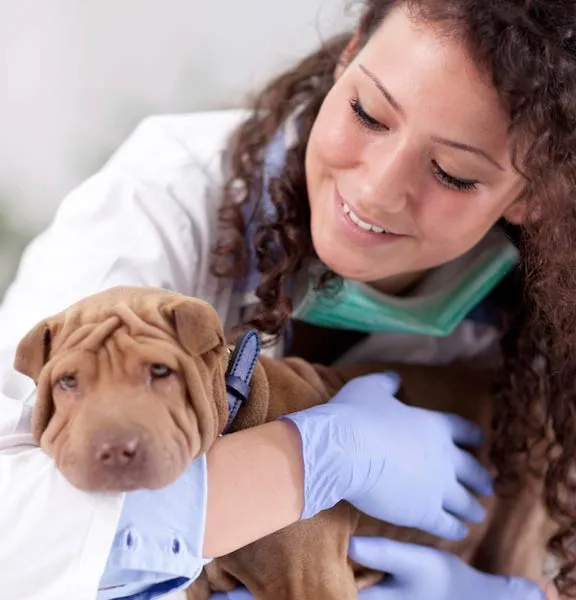Roundworms are among the most prevalent parasites affecting dogs, with the majority of canines experiencing an infestation at some point, particularly during puppyhood. Toxocara canis and Toxascaris leonina are the two primary species of roundworms that affect dogs. It’s important to note that Toxocara canis is not only more likely to cause serious illness in dogs, but it can also be transmitted to humans.
 German Shepard puppies
German Shepard puppies
Adult roundworms thrive in a dog’s intestinal tract, feeding on partially digested food. This parasitic activity can lead to malnourishment, which is particularly detrimental to young puppies. Due to their immature immune systems, puppies are more susceptible to the adverse effects of roundworms, as they are less capable of combating the adult worms compared to mature dogs. Understanding the lifecycle, transmission, and symptoms of roundworms is crucial for responsible dog ownership.
How Dogs Contract Roundworms
Dogs can contract roundworms through several pathways, understanding these pathways is essential for prevention.
From Their Mother: It is not uncommon for puppies to be born with roundworms. The larvae can be transmitted from the mother to the puppies either just before birth or through nursing. Dormant larvae can reside in a dog’s body tissues even after treatment and eradication of adult worms. During pregnancy, these larvae can reactivate and infect the puppies either in utero or through the mother’s milk. Deworming treatments for both the mother and puppies are crucial. Owners of pregnant dogs should consult their veterinarian about safe deworming options during pregnancy to reduce the risk of transmission.
Environmental Contamination: Roundworm eggs can be present in soil, on plants, and other objects. Ingesting these eggs accidentally from the environment is a common way for puppies and dogs to become infected.
Consumption of Infected Animals: Small animals like rodents, earthworms, birds, and insects can carry roundworm eggs. Although these animals are not the roundworm’s primary host, the eggs can activate and mature into adult worms inside a dog that consumes an infected animal.
 Lab puppies
Lab puppies
Recognizing the Signs and Symptoms of Roundworms in Dogs
While some dogs may carry roundworms without displaying any noticeable symptoms, several signs can indicate a roundworm infestation. Being able to identify these signs is key to early intervention.
Malnourishment: Roundworms can deprive dogs of essential nutrients, leading to symptoms of malnutrition. These symptoms can include weakness, weight loss, and stunted growth, particularly in puppies.
Pot-Bellied Appearance: In untreated cases, roundworms can multiply rapidly, leading to a distended abdomen or a pot-bellied appearance, especially in puppies.
Coughing: Roundworm larvae can migrate to the lungs, causing respiratory symptoms such as coughing and, in severe cases, pneumonia.
Vomiting and Diarrhea: Digestive upset, including vomiting and diarrhea, can be a sign of roundworms. Diarrhea can range from mild to severe.
Visible Worms: In some instances, dog owners may observe roundworms in the dog’s vomit or stool. These worms are often described as long, pale, and spaghetti-like, and they may still be moving. It is important to contact your vet immediately if you observe worms in your dog’s vomit or stool.
(If you observe small, rice-sized worms in your dog’s stool, it is more likely that your dog has tapeworms. Contact your vet if you see or suspect any parasite affecting your dog.)
Diagnosis of Roundworms in Dogs
Veterinarians typically diagnose roundworms through a microscopic examination of a fecal sample to detect the presence of roundworm eggs.
Fecal Examination: A fecal sample is examined under a microscope to identify roundworm eggs. This is a standard procedure during a puppy’s first vet visit.
Routine Deworming: Due to the high prevalence of roundworms, veterinarians often recommend routine deworming for puppies, even if the initial fecal examination is negative, as light infestations may not always be detected.
 Shar Pei at the vet
Shar Pei at the vet
Roundworms and Human Health
Although canine roundworms cannot complete their lifecycle in humans, they can still pose a health risk.
Transmission to Humans: Humans can become infected by accidentally ingesting roundworm eggs, such as through contact with contaminated soil. In humans, the larvae can encyst in various organs, potentially leading to serious health issues.
Preventive Measures: Regular deworming treatment for dogs, immediate removal of dog feces from public areas, and thorough handwashing, especially for children, are essential to prevent human infection.

Treatment and Prevention Strategies
Effective treatment and prevention strategies are available to manage roundworm infestations in dogs.
Deworming Medications: Veterinarians can prescribe safe and effective deworming medications to eliminate roundworms.
Preventive Medications: Monthly heartworm medications often include ingredients that also prevent and control roundworms.
Consulting with a veterinarian is crucial for obtaining expert advice on roundworm prevention and treatment and for addressing any concerns regarding your dog’s health and well-being.
Disclaimer: This article is intended for informational purposes only and does not substitute professional veterinary advice. If you suspect your dog has roundworms or any other parasite, consult your veterinarian for proper diagnosis and treatment.
